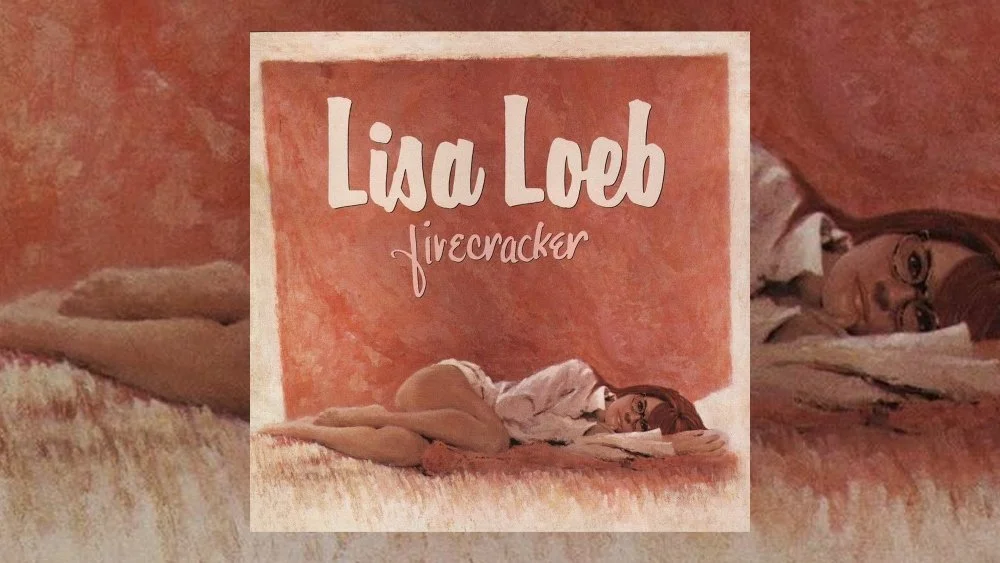Happy 25th Anniversary to Lisa Loeb’s Firecracker, originally released November 11, 1997.
As an Amazon affiliate partner, Albumism earns commissions from qualifying purchases.
Books and music took singer-songwriter Lisa Loeb from her childhood home of Dallas, Texas to the East Coast, to study at Brown University and Berklee College of Music. The former gifted Loeb with a degree in comparative literature in 1990, the latter led to the formation of her backing band, Nine Stories. While Loeb had already been one-half of Liz and Lisa, with Elizabeth Mitchell at Brown, Nine Stories gave her space to draft her own sonic blueprint. This was captured on the-then gig-exclusive Purple Tape (1992), later released on CD in 2008. Produced by Juan Patiño, it peeked into the dually reflective and reactive vibe that came to fruition on Loeb's first major hit in 1994, the Grammy nominated “Stay (I Missed You).”
The story behind this gem featured on the Reality Bites soundtrack is well known in that it made Loeb the first artist to top the American singles chart without a label deal. In the end, it brought Geffen Records calling and a year after “Stay (I Missed You),” Tails debuted; it later certified gold in America and platinum in Canada. The record was a compelling balance of subtle pop and rock brio, thanks to Loeb's patient, but impassioned singing and the Nine Stories backing―they were co-credited on the LP.
As 1996 rolled around, Loeb and Patiño―who had also worked on Tails―hunkered down to brainstorm a more cinematic sound for Loeb's next album, Firecracker. The Nine Stories found themselves absorbed into the general session musicians pool for the recording of Firecracker.
As with Tails, Loeb's songwriting on Firecracker cuts a detailed figure between an academic and emotional study of the consequences and conflicts of relationships. Musically, this avenue is explored by turning down the rock flame of Tails to focus on a nuanced pop smolder. Only “Split Second” and the title track hint at the earlier rock and roll musculature of Tails. The rest of Firecracker uses a quieter variation of Loeb's jangly guile on the record's opening track “I Do” and other entries like “Let's Forget About It” and “This.” On these songs, the guitar, bass and drums were prepossessing and guided the songs without drowning out Loeb.
Three of Firecracker's offerings―“Falling in Love,” “Furious Rose,” “Dance with the Angels”― demonstrate Loeb's newly minted musical template at the time. “Falling in Love” and “Furious Rose” are replete with sighing, tremulous strings, ideal companions to the stormy, magnetic narratives Loeb lyrically spins on these tracks. “Dance with the Angels” dabbles in a bubbly jazz base and co-mingles with her guitar pop; its affectionate use of vibraphone and bongos make for an alluringly good groove.
Watch the Official Videos (Playlist):
In October 1997, “I Do” was put forth as the initial single from Firecracker. The Phil Harder directed video became a staple on MTV and VH-1. With its stunning album cover rendered by the late painter and winemaker Mark Miller, Firecracker was given to audiences on November 11, 1997, and eventually claimed gold status in the United States and Canada. Critical reception was fairly positive and the album went on to garner a Grammy Award nomination in 1999 for “Best Engineered Album, Non-Classical.” Strangely, only one other single (“Let's Forget About It”) was pulled from Firecracker as 1997 turned into 1998.
Though the labels changed as the years went by, Loeb continued to record. Five traditional studio efforts trailed Firecracker: Cake and Pie (2002)―reissued later as Hello Lisa (2002)―The Way It Really Is (2004), No Fairytale (2013), Lullaby Girl (2017) and A Simple Trick to Happiness (2020). Loeb also pursued a bountiful career in children's music, releasing five records in this vein to acclaim between 2003 and 2016.
All of these subsequent accomplishments aside, Firecracker remains an impactful moment in her recording career. Remarking on the intention of Firecracker in its electronic press kit 25 years ago, Loeb stated, “On this album I wanted it to be even more intimate, I wanted to feel even closer to the audience with my voice.” The stylish magnitude of Lisa Loeb's literary pop took on a richer tone in its sound on Firecracker, one of the stronger records of its era.
As an Amazon affiliate partner, Albumism earns commissions from qualifying purchases.
LISTEN:
Editor's note: this anniversary tribute was originally published in 2017 and has since been edited for accuracy and timeliness.

